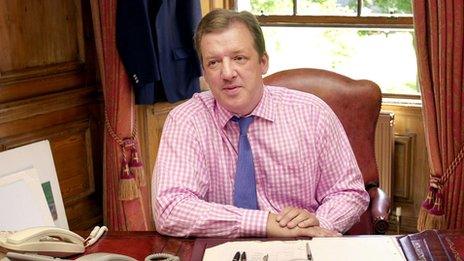The very slow slaying of Sir David's Goliath
- Published

Murray rose to prominence through his time at the helm of Rangers
It was Rangers that brought Sir David Murray fame. His fortune had more to do with metal and property.
The connection with the Ibrox club probably brings more notoriety than fame these days, given the way in which he sold it on, disastrously, to Craig Whyte.
And much as he said in last year's accounts from his holding company, Murray International Holdings (MIH), Sir David profoundly regrets having done that, remaining "staggered" at the revelations that followed, bitterly disappointed at the outcome and saddened at ongoing uncertainty.
There's a lot else in these accounts that are staggering for the scale of the losses elsewhere. And yet there's oddly little sign of any disappointment that the Murray business empire has been almost entirely dismantled.
Hitting the recession, many other companies - and particularly those exposed to property losses - had the plug pulled by their bank. The process can be rapid and brutal.
But Lloyds Banking Group - inheriting the splurged loan book of Halifax Bank of Scotland - has allowed Sir David the chance to sell off his assets piece by piece. It didn't appear to leave him much choice. But it's taken five years so far, and it's still been rather brutal.
Harsh measures
First was Rangers, famously handed over for one pound. The cost of the legal fight with HM Revenue and Customs over its tax affairs has since cost his company £2.5m, and it's not over yet.
The following year, ending June 2012, saw much of the steel business go. There followed a management buy-out of Premier Hytemp, supplying the oil and gas industry, which remained a lot healthier, but still resulted in a £10m loss to MIH on its sale.
More recent times, including the period since the end of these 2012-13 accounts, have seen some harsh measures being applied to the property portfolio.
Three shopping centres have been sold, for less than half of what they cost. And without them, Murray International Holdings is admitting that it can't meet its pension obligations. It's still trying to negotiate lower benefits than beneficiaries had been promised.
Likewise, it's still trying to find a buyer for Response, the contact centre business. It lost a big Sky contract, but has since won another one for Scottish Power, claiming the energy utilities' woes offer a rich opportunity for contact centre expansion.
However, I'm told (from sources outside MIH) that rival companies offered a chance to buy have not been attracted by the state of the business.
As a result of this offloading, group turnover in the year to last June was down to £85m from £351m. The operating loss on ordinary activities, before exceptional items, has fallen too, from £13m to £7.6m.
Debts and impairments
But on exceptional items - and MIH has just posted an exceptional set of accounts - the loss is breathtaking.
With £95m impairment losses on development property and land, the pre-tax loss for 2012-13 came to £142m.
And if you're wondering why Lloyds Banking Group is indulging this slow-motion corporate train wreck, it's at least partially explained by net liabilities last June of £225m, compared with £80m the previous year.
Amounts owed to creditors last June within one year: £151m. Falling due after more than one year: £225m.
You won't be surprised to know that Sir David is rather grateful to Lloyds Banking Group, as both lender and shareholder. "The partnership approach is genuinely appreciated by the group and the directors," he writes.
That said, one of the three directors quit last year. Sir Angus Grossart, the long-time chief dealmaker of Edinburgh finance, left the MIH board in July.
In precisely the same words recently used of Rangers International Football Club, the holding company at Ibrox, the MIH auditors say there is "existence of a material uncertainty which casts significant doubt about the group's ability to continue as a going concern".
And with hard times biting, the highest-paid director - let's assume that's Sir David Murray - earned £391,000 for the accounting year, down from £813,000.
'Significant achievement'
At least as interesting is who's buying these assets. Step forward... the Murray family. It has a 70% stake in MIH, but it also owns other vehicles for buying fire-sale assets.
For the majority of assets in the the Murray Estates property portfolio, MIH received what's called "an unsolicited approach from the Murray family".
We're told the discussions between the new family firm and the firm controlled by the family were protracted.
At the end of this tale of woe, perhaps the strangest bit is that Sir David Murray presents it as a sort of triumph: "In the prevailing economic conditions since 2009, the delivery of the numerous asset disposals and debt reduction programme represents a significant achievement and a very credible performance."